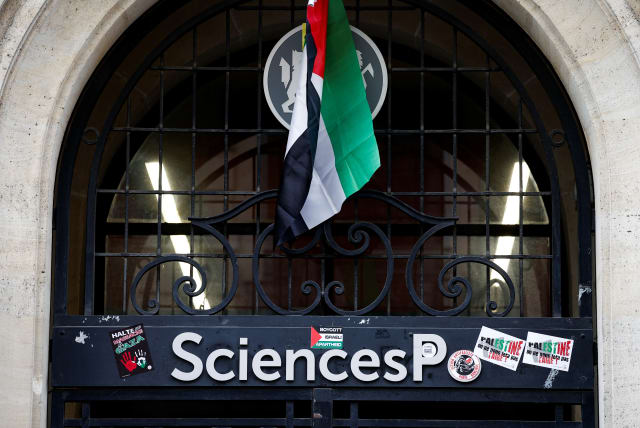French students return to campus wary of renewed anti-Israel activism

Since the October 7 Massacre, Jewish students had been deeply troubled, and they faced rising antisemitism not just on campus but in broader society.
With the beginning of the academic year in September, some French Jewish students are apprehensive about returning to campuses and facing renewed anti-Israel activity.
A representative of the Union of French Jewish (UEJF) students told The Jerusalem Post that, like other countries, French universities had been host to protests, building occupations, and encampments the previous academic year. She was worried that the incidents that had occurred throughout the year would continue in the new year.
Jewish students had experienced antisemitism and discrimination from their anti-Israel peers, and the union said that many university administrations had to be more responsive to secure the safety of Jewish students.
“I wanted to transfer to another university – maybe one in Israel – but my grades had suffered because of what’s been going on,” said a Jewish student at the Paris Institute of Political Studies (Science Po) who wished to remain unidentified.
In March she had been at the center of a major incident at the university when she was denied access to Comité Palestine’s 4 Hours 4 Palestine at the Émile-Boutmy amphitheater. The event featured lectures about Palestinian perspectives, refugees, Judaism, and anti-Zionism.

The group claimed that they had denied access to the student based on their history of harassment and intimidation of pro-Palestinian students. UEJF’s representative said that she had been singled out because of her identity in an act of antisemitism that drew condemnation from officials such as Diaspora Minister Amichai Chikli and French Minister of the Interior Gérald Darmanin.
“I wanted to attend the event to listen,” said the student, who explained that rumors and lies about her had been spread online. She insisted that she had wished to genuinely attend the event and had no intention to disrupt the proceedings. There was no reason to have an event discussing Jews at a university she enrolled in and to have the ability to bar a Jew from entry, she said.
The student faced bullying and harassment online, and she and her friends felt uncomfortable in the face of frequent anti-Israel protests on campus.
“I only went to the university to take exams,” the Sciences Po student said, having been ostracized from the campus.
Verbal and physical abuse
In July UEJF published testimonies of physical and verbal abuse on Sciences Po campuses. One Jewish student said that she was strangled from behind and told that she would be treated the same as people in Gaza. Another student was warned not to say they’re Jewish because a peer would kill them.
UEJF’s representative highlighted another incident in January, in which three Jewish students were beaten and called “Zionist fascists.” According to a February UEJF statement, the students had been putting up posters calling for the release of hostages held by Hamas. They were threatened to stop putting up posters by another student, and when they refused she returned with five other people who assaulted them.
She pointed to the significant role that far-left groups had in escalating the situation on campuses.
“We can engage in Muslim and Arab student groups in conversation about the conflict, but radical leftist groups are treating Jewish students as collaborators for the war in Israel,” she said.
Like almost all of the mainstream French Jewish organizations, UEJF advocated against voting for the right-wing National Rally or for supporting Jean-Luc Mélenchon’s far-left La France Insoumise (LFI) in the July parliamentary elections. The election resulted in a victory for the left-wing New Popular Front coalition, and the UEJF representative noted that some far-left politicians had encouraged the anti-Israel protests.
“This morning, in La Grande-Motte, the arsonist was wearing a keffiyeh and a Palestinian flag,” UEJF said on X on Saturday in response to the terrorist attack on a synagogue in the south of France. “Politicians, from LFI and elsewhere, who minimize antisemitism, justify terrorism, and point the finger at Jews are complicit.”
The UEJF representative said that since the October 7 Massacre, Jewish students had been deeply troubled, and they faced rising antisemitism not just on campus but in broader society.
Increase in antisemitism
The Jewish Community Protection Service told the Post in late July that its figures indicated a 1000% increase in antisemitic incidents in France in 2023 compared to 2022. In June, France’s Committee on Culture, Education, Communication, and Sport released a report indicating a climate of antisemitism on campuses. The researchers had recorded 67 antisemitic incidents on campuses since October 7, twice the amount in the previous academic year.
French officials expressed outrage in the wake of the La Grande Motte attack and called for taking a stand against antisemitism.
At the beginning of May, Paris police entered Sciences Po and removed the dozens of students who had occupied its main buildings in central Paris. At the end of April, Police cleared the encampment at the Sorbonne University in Paris.
While officials are more aware of the problems of rising antisemitism and the precedent of police action against campus agitators has been established, French Jewish students will return after several months of feeling unwelcome.
Mathilda Heller contributed to this report.
